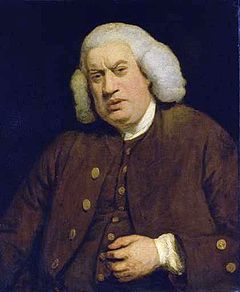
Samuel Johnson, "Preface" to The Dramatic Writings of William Shakespeare (1765)

Samuel Johnson (1709-1784) was one of England's greatest literary figures. He was a poet, critic, essayist, biographer, and singlehandedly wrote the influential A Dictionary of the English Language (1755).
In this passage from his "Preface" to The Dramatic Writings of William Shakespeare, Johnson challenges Voltaire's criticisms.
This is the praise of Shakespeare, that his drama is the mirror of life; that he who has mazed his imagination in following the phantoms which other writers raise up before him, may here be cured of his delirious ecstasies by reading human sentiments in human language, by scenes from which a hermit may estimate the transactions of the world, and a confessor predict the progress of the passions.
His adherence to general nature has exposed him to the censure of criticks, who form their judgments upon narrower principles.…Voltaire censures his kings as not completely royal. Dennis [this was the author of An Essay on the Genius and Writings of Shakespeare, 1712] is offended that Menenius, a senator of Rome, should play the buffoon; and Voltaire perhaps thinks decency violated when the Danish usurper is represented as a drunkard.
But Shakespeare always makes nature predominate over accident; and if he preserves the essential character, is not very careful of distinctions super induced and adventitious. His story requires Romans or kings, but he thinks only on men. He knew that Rome, like every other city, had men of all dispositions; and wanting a buffoon, he went into the senate-house for that which the senate-house would certainly have afforded him. He was inclined to show an usurper and a murderer not only odious, but despicable; he therefore added drunkenness to his other qualities, knowing that kings love like other men, and that wine exerts its natural power upon kings. These are the petty cavils of petty minds; a poet overlooks the casual distinction of country and condition, as a painter, satisfied with the figure, neglects the drapery.